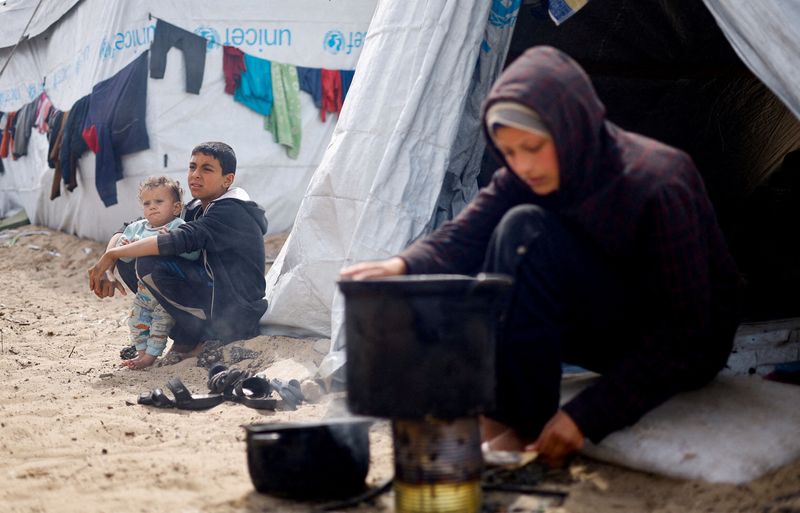
©Reuters. FILE PHOTO: Displaced Palestinian children, who fled their homes due to Israeli attacks, sit in a tent camp, amid the ongoing conflict between Israel and the Palestinian Islamist group Hamas, in Rafah, southern Gaza Strip, on March 6, 2024. REUTERS/ Mo
2/5
By Nidal al-Mughrabi and Michele Kambas
CAIRO/LARNACA, Cyprus (Reuters) – The head of the European Commission said on Friday that a maritime aid corridor could start operating this weekend between Cyprus and Gaza, as part of accelerating Western efforts to ease the humanitarian crisis in the war-torn Palestinian enclave.
Ursula von der Leyen’s comments came a day after President Joe Biden announced plans for the US military to build a “temporary pier” on Gaza’s Mediterranean coast, amid warnings from the United Nations of famine among the territory’s 2.3 million people.
Negotiations over a possible ceasefire in Israel’s war against Hamas, now in its fifth month, remained stalled in Cairo, with time running out to reach a truce in time for the Muslim holy month of Ramadan, which should start on Sunday.
European Commission President von der Leyen said a pilot test of food aid raised by a charity group and supported by the United Arab Emirates could leave Cyprus as early as Friday.
“We are launching this Cyprus maritime corridor together, the European Union, the United Arab Emirates and the United States,” he said after visiting facilities in Larnaca, Cyprus.
“We are now very close to opening this corridor, hopefully Saturday-Sunday and I am very happy to see that a first pilot project will be launched today.”
US officials say construction of the pier described by Biden could take weeks. Meanwhile, hospitals in northern Gaza are already reporting the deaths of children due to malnutrition. The UN says opening more land routes should remain the priority.
“There will be no American troops on the ground,” said Biden, who did not indicate where the planned pier might be located. Most of Gaza’s coast is beaches, and larger ships would not be able to get close without dredging.
“It will take time to build,” British Foreign Secretary David Cameron told reporters, adding that in the meantime Israel should open its port in Ashdod, north of Gaza, for further aid deliveries.
Some aid agencies say discussions about elaborate air and sea routes to bring aid to Gaza are a distraction when Israel is restricting existing land access routes.
“There is a simpler and more efficient way to deliver assistance and that is through the road crossings connecting Israel to Gaza,” said Juliette Touma, spokeswoman for UNRWA, the United Nations relief agency for the Palestinians.
Michael Fakhri, the United Nations special rapporteur on the right to food, told reporters in Geneva that it was “absurd” that Washington was discussing complicated new routes to reach territory blocked by its own ally.
“From a humanitarian perspective, from an international perspective, from a human rights perspective, it’s absurd in a dark and cynical way,” he said.
Israel says it is not blocking aid through two checkpoints at Gaza’s southern tip, and blames the UN and other agencies for failing to transport and deliver enough aid. Aid agencies say this is nearly impossible in a war zone and Israel is responsible for ensuring safe access.
“STOP THE KILLINGS”
Hassan Maslah, a displaced Palestinian from Khan Younis who is now taking refuge in Rafah, said that instead of promising to build a new port, Washington should stop arming Israel.
“All these American weapons are killing our children, and killing us everywhere we go. We don’t need their help, we need them to stop the killing, stop the death,” he said, as Gazans sifted through rubble nearby , one after the other. Israeli air attack.
The United States and other countries have also dropped supplies, although the amounts involved are small.
Five Palestinians were killed and several injured when boxes of aid dropped from planes mistakenly fell on them Friday in northwest Gaza, said Mahmoud Basal, spokesman for the civil emergency service in Gaza.
Some footage showed dozens of people running as the boxes were dropped, shouting among themselves to avoid the boxes.
Separately, Palestinian health officials said eight people from a family were killed in an Israeli airstrike on their home in Khan Younis, in the southern Gaza Strip.
Ceasefire talks have stalled
Time is rapidly running out for ceasefire talks to reach agreement on a proposed six-week truce that Washington hoped could be implemented by Ramadan, which is due to begin on Sunday.
Egyptian security sources said ceasefire talks, which are taking place in Cairo without an Israeli delegation, would resume on Sunday, amid fears that violence could intensify across the region during the Muslim holy month.
US Secretary of State Antony Blinken repeated Washington’s assertion that an Israeli-approved ceasefire proposal is on the table, and it is now up to Hamas to accept it.
“The problem is Hamas. The problem is whether or not Hamas will decide to have a ceasefire that would benefit everyone,” Blinken said. “The ball is in their court. We are working hard on it and we will see what they do.”
Hamas rejects this characterization of the talks as an attempt by Washington to deflect blame from Israel should negotiations fail.
Israel has said that any ceasefire must be temporary and that its goal remains the destruction of Hamas. Hamas says it will only release its hostages as part of a deal to end the war.
By Israeli counts, the Islamist group precipitated the war by killing 1,200 people and kidnapping 253 during a frenzied attack in Israel on October 7. In response, Israel launched a ground offensive and aerial bombardment on the densely populated Gaza Strip that, as of Friday, had killed at least 30,878 Palestinians and injured 72,402, according to the Hamas-run enclave’s health ministry.